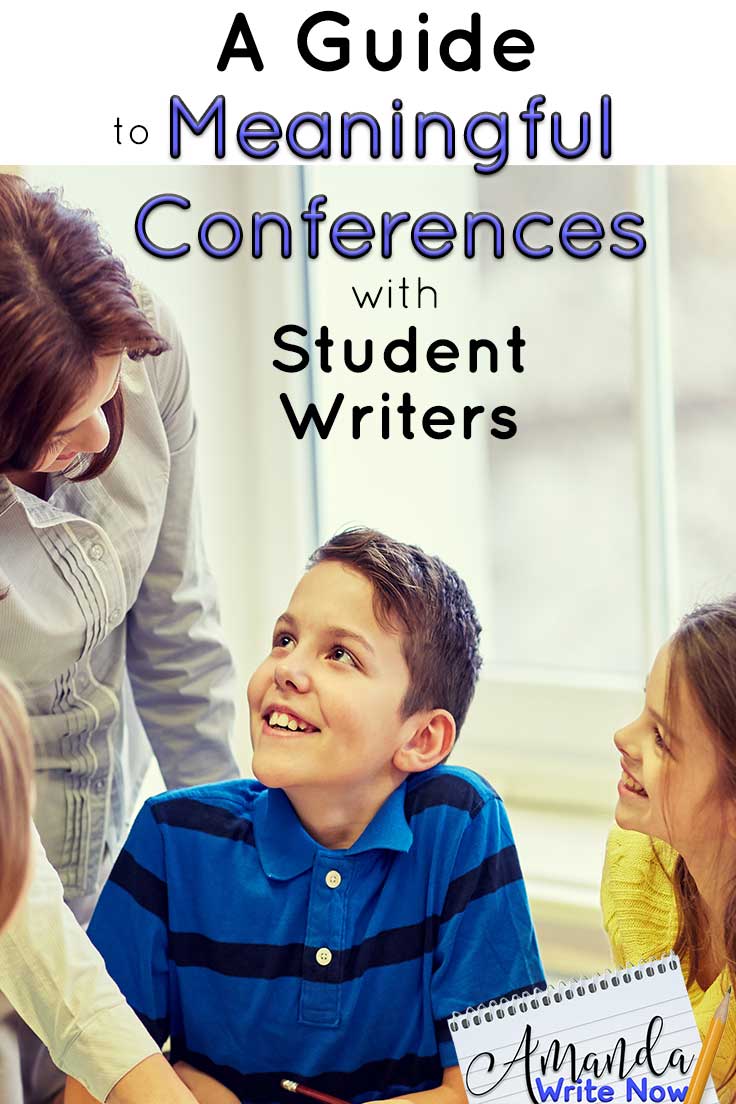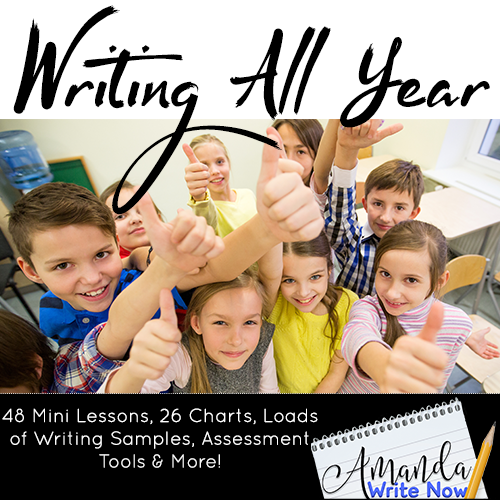
Writing conferences are the toughest part of the writing workshop class. If you are new to writing workshop don’t worry too much about the conferring at first. Just do your best to roam the room while students write with quick tips and encouraging statements.
What is conferencing, really?
- Conferencing is supporting writers while they are writing.
- It is differentiation at its finest.
- It is challenging and takes lots and lots of practice!
- It is essential to support all your writers.
Excuses We All Make
Many teachers avoid conferring because they feel overwhelmed with many writers needing help at the same time. Teachers aren’t sure how to go about holding conferences or they feel bad for interrupting students who are hard at work. Don’t worry all teachers of writing feel these things! It is important to remember that if you don’t jump in and try, it will be difficult to really support the diverse skill levels in your class without having some sort of conferring process in place.
Writing Independence
You can’t have successful conferences if your students aren’t writing independently yet. To build independence students must have time to practice stamina. To build writing independence have “writing races”. Students write for a number of minutes without stopping. Teach what to do when you don’t have ideas and what to do when you think you are done. Make charts and teach mini lessons to build independence before launching into the conferring process with your class.
Okay now that we’ve got the tough stuff out of the way let’s get busy practicing. Below are some helpful tips for how to go about practicing your conferring techniques. I say practice, because, well, we are all just practicing, no one is an expert at this. If you want to hone your craft, I highly recommend these books by: Lucy Calkins and Carl Anderson (these are Amazon affiliate links, this means if you purchase, I will earn commission).
Conferring Structure
1. Keep it short and to the point (5 min or less).
This is challenging I know, but you can do it! Set a timer for yourself if you have to.
2. Praise first.
Always, always praise! You want your student to be motivated after conferring with you. You definitely don’t want them to feel discouraged or overwhelmed after the conference. Praise helps tremendously. Pick a skill from the skill/term list and put “I love how you…” in front of it! Here are some examples:
“I love how you elaborate here…”
“I love how you use paragraphs here…”
“I think it’s fantastic you are trying out (insert skill/term) here…..”
3. Teach one skill/term at a time.
As stated above, you don’t want your student to feel overwhelmed or discouraged after leaving the conference. So don’t go on and on about what your student can work on. Just pick one skill and stick to it! Timing yourself helps to do this too.
4. Stick to skill/term you’ve covered already.
Try not to introduce new writing skills during a conference because you don’t want to confuse your writers during the conferring process. The only exception to this is if you have a gifted writer who is ready to move on.
5. Allow opportunities for students to be experts/teachers.
If you’ve noticed particular students are excelling at certain aspects of the writing process or certain skills you’ve been teaching, use their writing! Say things like, “Sarah really knows how to create leads, you should go talk to her or you should read her story to get some ideas.” This can be incredibly empowering for writers…knowing you noticed their efforts and believe they can be teachers too!
6. Have your students name the skill/term they want help with.
After a few weeks into a unit your students should begin using the terms you’ve been teaching such as lead, stamina, organization, theme etc. So, one day you might say something like… “Today if you need help from me I’d like you to name what it is you need help with. I want to help as many writers as possible and can’t read every writer’s entire piece during a 30 minute period, so pick the skill and part of your piece you want feedback on before coming to see me.”
Types of Conferences
Teach the types of conferences to your students so that they are aware of how the process works and you don’t have random students tapping you on the shoulder while you are in the middle of a conference!
1. Stacked
During writing work time you want to support as many writers as you can but have a limited amount of time. One way to solve this time problem is by “stacking” your conferences. This idea is from When Workshop Isn’t Working by Mark Overmeyer (this is an Amazon Affiliate link, which means if you purchase I will get a commission).
Here’s how it works: call a writer to you, confer for 5 minutes , tell the writer to stay next to you to try out what you’ve just suggested. While they work you can then call the next writer over to confer and repeat the process of having that writer stay next to you to try out what you’ve suggested and so on. The great thing is that you control who you call over and students are able to practice next to you so that they get guidance as needed. To make this process even better it helps to decide ahead of time who you will call over after reading their work and deciding on a skill they need support with.
2. Post Mini Lesson
After a mini lesson you can allow students who are still struggling to stay at the meeting area if they choose. If you allow students to do this it can be a management problem because you’ll notice the same students are sitting there waiting for you to hold their hand everyday. This is why you should only do this type of conference every once and awhile. The benefits of this type of conference are that you will weed out the students who need to be hand held during work time and those that can work independently. You’ll want to teach this group of students strategies for becoming independent writers.
How do I teach writing independence you may be thinking? Here are some strategies:
Have a writing race with students, say, “who can write for the longest without stopping?”
Create a chart “How do I get ideas to write about?” and practice using it!
Story tell/orally explain before writing.
Let students use computers/laptops to write.
3. Voice Overs
As you roam the room during writing work time you can give writing tips out loud as you notice patterns. This is a powerful type of conference because you are reaching many students all at once and you are using your observations to guide you in the kinds of things you say. If you don’t interrupt your students while they write, you should start! At least once during a 30 minute session stop your writers and give them a quick tip. “I noticed Stevie is underlining and boldfacing the bigger topics and using regular font for the subtopics, maybe we all could try something like that!” Inserting examples of the skill/term in your voice overs is key!
4. Whole Class
It is important to not only teach mini lessons during writing workshop but also conduct a class meeting about writing from time to time. Say something like, “Class what is the hardest part of doing this kind of writing?” See what comes up and let the students lead a discussion about how to overcome that struggle that is so common in your class.
5. Side By Side
Pick a randomly selected group of 5-6 writers to do their writing along side you. Tell them that as they work today you will be there to support them in any way they need in the moment. This can be an excellent way to meet with students that get little time with you or aren’t as apt to ask for help. It also helps to read their writing prior to having the side-by-side conference too, so that you have an idea of the kinds of skills you can teach.
Sentence Stems
Keep some conferencing sentences stems on a clipboard available and visible during your conferences. You should also have a chart for your students that lists possible ways they can respond to your conferring questions.
Conferencing Sentence Stems for Teachers
What are you most proud of today?
What is going well for you right now?
What skill/term are you trying out right now?
What specific skill/term are you struggling with right now?
What is your next step?
What are you most proud of in this piece?
Conferencing Sentence Stems for Students
I am most proud of_________________ (help students see the positive in their piece).
I am improving in _________________(help student see what is going well).
I am working on_____________(help writer to name the skill/term in their writing).
I am struggling with_______________ (help writer name one skill/term they are weak in).
I am going to ______________ (help writer decide on a plan of action).
Curriculum


0 Comments